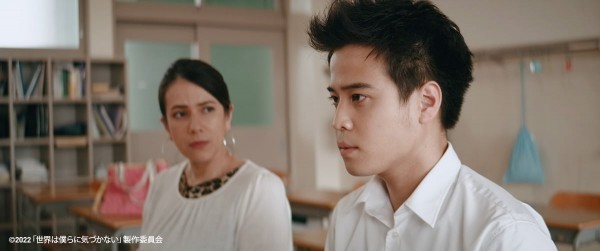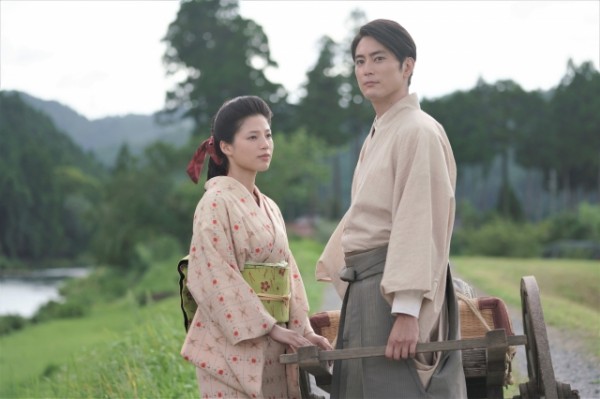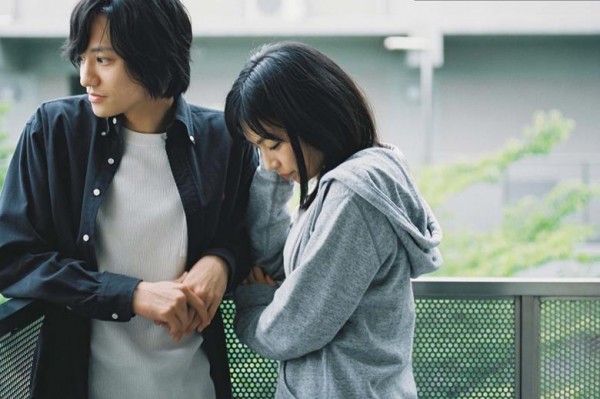KASHO IIZUKA: ANGRY SON/ 世界は僕らに気づかない (Japan 2022)
GOW AND KAZUKI HORIKE IN ANGRY SON
The coming of age of a beleaguered "Jappino" is a messy but irresistible tale
As hinted in Li Gen's Before Next Spring, also NYAFF 2022, a film about Chinese emigrants living in a Tokyo suburb, there is no such thing as assimilation in Japan, and here we see that's true even when you were born there if you're not pure Japanese. Kasho Iizuka's entertaining, annoying, and heartfelt little film Angry Son focuses on Jungo (Kazuki Horike), a "Jappino" or biracial Japanese-Filiipino teenager. He lives combatively with this reality in a Japanese suburb with his Filipina bar hostess mother Reina (singer and actress GOW, whose acting is too crude and strident), who loves but maddens him and whom he rails at constantly in private, departing from his generally buttoned-down Japanese manner. He obviously speaks native fluency Japanese and would assimilate if they'd let him.
Jungo also happens to be gay, and he has a strong link with the society: a devoted Japanese boyfriend, Yosuke, whose family accepts his sexuality and their relationship. But Jungo and Yosuke become estranged. It seems permanent, and in the wake of this disaster Jungo, academically unmotivated (and not planning to go on to university), hurt by the regular racist and sexist abuse he suffers from present and former classmates and wanting to find shelter away from his annoying mother, becomes obsessed with searching for for the Japanese birth father he has never met - while still constantly fighting with the well-meaning but sometimes obnoxious mother.
This film engages us with its wealth of human experience. It has two weddings and a funeral, tearful reunions, and a presentable and resilient young protagonist, whose perpetually going around with a camera around his neck snapping photos may make him a cliché artist-autobiographer, but we get the point. The film is also technically unimpressive (the rickety handheld cinematography hardly seems intentional), the casting is often dubious and unappealing, and events play out with a jerky pulse more suited to a meandering TV sitcom than a slightly overlong feature film. But eventually its sincerity may grab you.
There are a number of little scenes where Jungo, the protagonist, is teased or humiliated by classmates for being half-Filipino or for being gay. He was born here in Japan and speaks as far as we know only Japanese. He has to live with the fact that while he gets maintenance payments from his father's family, his mother is in thrall to an extended family in the Philippines she tries to send money to even though she never has any and the electricity in their tiny apartment repeatedly gets cut off. She also violates Japanese manners as he would never do, yelling at her boss at a new job, which humiliates him. He can yell sometimes, perhaps to his benefit, but he also has an inbred sense of Japanese politeness and deference and knows when to bow and be silent and humble.
The meandering structure takes Jungo around the world of Filipino hostess bars as he does some surprising detective work tracking down the family of his birth father, who met Reina in one years ago. It also takes us into the relationship of Yosuke, Jun's boyfriend, with his family and the sudden appearance of a self-declared "asexual" young woman who knows of the boys' relationship and wants to form a three-cornered family with them in which Yosuke will enable her to have children the three of them will raise. Scenes with Yosuke's family show their warmth not only toward the boys' relationship but toward their plan - once they reunite and Jungo pledges steadfastness, love, and loyalty - to take advantage of new local regulations allowing legal same-sex partnerships.
Director Iizuka identifies as trans and as having experienced some of the issues of Angry Son first hand. IMDb shows another film by Iizuka this year, The World for Two of Us, depicting a ten-year relationship of a woman with a trans person (Angry Son isn't listed on the site). Angry Son is a well-meaning and heartfelt film. The director has things to say about subjects new to Japanese films.
Reviewed by Hayley Scanlon in Windows on Worlds and with a directorial interview by Marina D. Richter in Asian Movie Pulse, but information is lacking, including an IMDb page.
Angry Son 世界は僕らに気づかない ("The World Doesn't Notice Us"), 111 mins., was screened for this review as part of the Jul. 15-31, 2022 New York Asian Film Festival where it is in the Uncaged Award for Best Feature Film Competition. It has been shown at several festivals including Osaka and Frankfurt. North American premiere.
NYAFF 2022 SHOWING: Thursday Jul 31, 9:30pm (Walter Reade Theater, Film at Lincoln Center).
Director Kasho Iizuka will attend the screening.





 Reply With Quote
Reply With Quote






Bookmarks